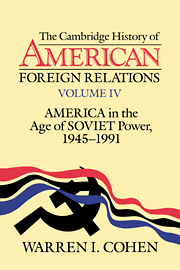Book contents
- Frontmatter
- Prelude
- 1 At war’s end: visions of a new world order
- 2 Origins of the Cold War
- 3 The Korean War and its consequences
- 4 New leaders and new arenas in the Cold War
- 5 Crisis resolution
- 6 America’s longest war
- 7 The rise and fall of Détente
- 8 In God’s country
- Conclusion: America and the world, 1945–1991
- Bibliographic essay
- Index
- THE CAMBRIDGE HISTORY OF AMERICAN FOREIGN RELATIONS
- References
5 - Crisis resolution
Published online by Cambridge University Press: 28 March 2008
- Frontmatter
- Prelude
- 1 At war’s end: visions of a new world order
- 2 Origins of the Cold War
- 3 The Korean War and its consequences
- 4 New leaders and new arenas in the Cold War
- 5 Crisis resolution
- 6 America’s longest war
- 7 The rise and fall of Détente
- 8 In God’s country
- Conclusion: America and the world, 1945–1991
- Bibliographic essay
- Index
- THE CAMBRIDGE HISTORY OF AMERICAN FOREIGN RELATIONS
- References
Summary
The tension of the years 1958–62 was without parallel in the four decades following World War II. Concerns over Berlin and Cuba led American forces to confront Soviet forces in situations in which a misstep, a rash action by an aggressive or nervous officer, might have led to war, might have led to the incineration and irradiation of much of the world. Nikita Khrushchev provoked each of these crises. The Soviet triumph in the space race, the launching of Sputnik in 1957, confirmed his faith in the ultimate triumph of communism, and he hoped to accelerate the process in the era of his leadership. He found American arrogance intolerable and was intensely eager to terminate it by reversing the strategic balance. Berlin he delighted in calling the “testicles” of the West: “Every time I give them a yank they holler.” Cuba, ninety miles from the coast of Florida, provided a convenient platform for placing the nuclear missiles that would teach Americans what it felt like to live under the shadow of the bomb, would put an end to the American penchant for nuclear blackmail.
Although provoked or precipitated by Soviet behavior, the crises of this era cannot be understood without recognizing the interactive quality of Soviet actions and statements, the extent to which they were responses to the policies of the United States and its allies. The Soviets had reacted with notable calm to West German integration into NATO, presumably recognizing that NATO contained the Germans as well as the Soviet bloc.
- Type
- Chapter
- Information
- The Cambridge History of American Foreign Relations , pp. 121 - 146Publisher: Cambridge University PressPrint publication year: 1993



